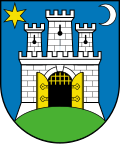| Mayor of the City of Zagreb | |
|---|---|
| Gradonačelnik Grada Zagreba | |
 The Mayor’s chain of honour | |
| Appointer | Direct elections (before 2009: by Zagreb Assembly) |
| Term length | 4 years unlimited number of renewals |
| Inaugural holder | Janko Kamauf |
| Formation | 1851 |
| Website | zagreb.hr |
This article contains a list of people who have served as mayor of Zagreb, the capital of Croatia, or president of the Zagreb Assembly.

























